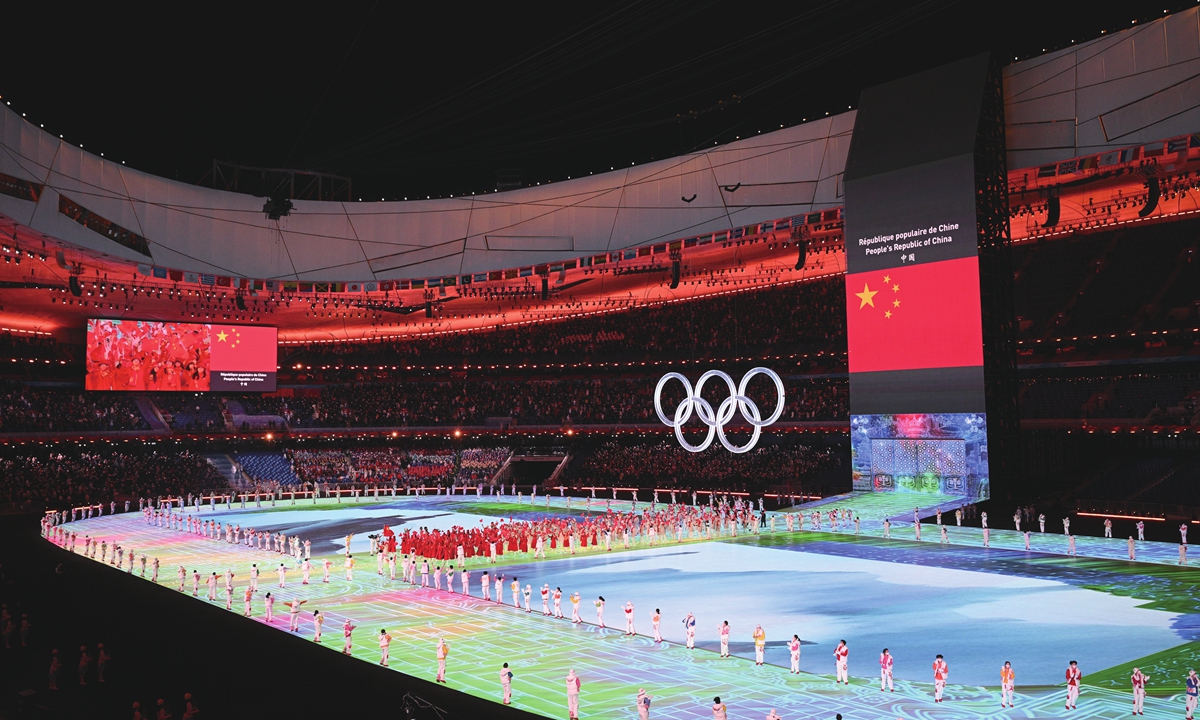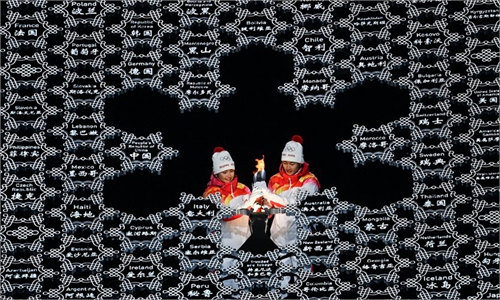All eyes on the Beijing Winter Olympics witness a weakened US: Martin Jacques

Members of Team China wave during the opening ceremony of the Beijing 2022 Winter Olympics at the Beijing National Stadium on February 4, 2022 in Beijing, China. Photo: VCG
2022 is not 2008. In 2008, the West was warming to China. It had growing expectations of their relationship. Since then, the warmth has been replaced by a cold chill. China did not westernize in the manner that the US expected and required. Worse, China got stronger as the US grew weaker. By 2016, the US was disillusioned that its hopes had not been fulfilled. It turned against China and sought to ostracize it. The Beijing 2022 Winter Olympics take place in a very different atmosphere to the Summer Olympics in 2008. No doubt the US wishes it wasn't taking place at all. There is nothing it can do about that; so it resorted to a "diplomatic boycott." But this has been a damp squib. Who really cares whether or not US diplomats attend; sure, it is better if they are present, but if they aren't, the price of their absence is very small. It is a weak gesture made all the weaker by the fact that the boycott has remarkably few backers, 14 in total.
The roll-call is as revealing as the pitifully small number. Only four members of the European Union have backed it (three others are not sending government representatives but that is because of COVID-19). Germany and France refused to join the boycott. New Zealand gave COVID-19 as their reason for not sending government representative, while Japan declined to send government officials but has sent Olympic officials. The US boycott is pretty close to being a non-event: without the Anglophone countries, it would be almost invisible. If the 2008 Summer Olympics marked China's dramatic arrival on the global stage, the 2022 Winter Olympics bear witness to the extraordinary decline of US influence over the 14-year period that separates the two events. If any further evidence of US decline is required in this context, take your mind back to the Moscow Summer Olympics in 1980 when, at the height of the Cold War, America staged a total boycott (athletes included) which amassed 66 countries.
All of this is telling us something of much broader significance concerning the nature of the post-2017 world. Three things to be exact. First, the estrangement of the US and China will be long-lasting. Five years and still very much counting; not less than 10, more like 20, 30 years wouldn't surprise me. The growing schism is becoming more and more embedded in the global fabric. Second, the US decline is continuing apace, seems highly likely to continue and will probably accelerate. As the failed boycott illustrates, the US is floundering around, making it up as it goes along. Third, when this era comes to an end, as it eventually will, whenever that might be, there will be no return to the status quo ante or, if you like, 2016. The world will be very different. It will still be one world, but much more loosely so, dominated by two spheres, a Chinese one and an American one, with the former increasingly dominant.
There is another reason why the 2022 Winter Olympics will be very different from the 2008 Summer Olympics. I am not thinking here of the pandemic, even though, of course, this has necessitated a fundamentally different kind of event. The fact is that the Winter Olympics are of a far more modest scale than the Summer Olympics: many less athletes, many less disciplines and rather less global appeal. The position of China is also interestingly different. It has much less experience of the Winter Olympics and there is much less of a tradition of involvement in the winter sports. China cannot be compared with the traditional North American and northern European giants of the Winter Olympics, such as the US, Canada, Germany, Switzerland, and Norway. Whereas for the great coming-out party in 2008, China could not only entertain the idea of winning more golds than any other country, but it actually achieved that goal. In 2022 this is impossible. But life - for countries as for individuals - is not always about coming top, it is much more about moving forward. China is intimately familiar with this. That has, after all, been China's story since 1978.
In fact, it is rather remarkable that China put its hat in the ring to stage the 2022 Olympics, such was its rather intimidating starting point. Not only was China confronted with the challenge of creating, more or less from scratch, the necessary infrastructure for the Games, a task made even more difficult by the pandemic, but in typical Chinese "never do things by halves" style, it has seen the Olympics as an opportunity to transform remote mountainous regions of the country into winter sport resorts; 400 were built between 2014 and 2017, with a target of 800 this year.
If the story of the 2008 Olympics was all about Beijing and its new modernity, the story of these Olympics is about China's urban-rural divide and the challenge of transforming some of the poorest and most remote areas of the country and providing them with a state-of-the-art transport infrastructure ensuring their connectivity with the rest of China. Now there's a lesson for the world.
The author was until recently a Senior Fellow at the Department of Politics and International Studies at Cambridge University. He is a Visiting Professor at the Institute of Modern International Relations at Tsinghua University and a Senior Fellow at the China Institute, Fudan University. Follow him on twitter @martjacques. opinion@globaltimes.com.cn


